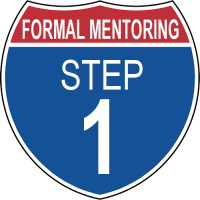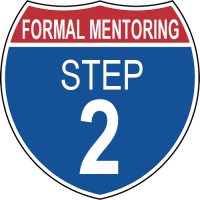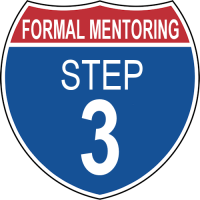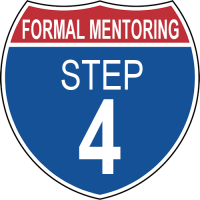Overview

Cette information est destinée à ceux qui envisagent le Mentorat Formel et de référence pour ceux qui sont déjà dans une relation de Mentorat. À titre indicatif, il devrait vous aider à décider si le Mentorat est bon pour vous et fournir aux Mentors et aux Mentorés une meilleure compréhension de l'approche et des options possibles. Vous pouvez choisir d'utiliser uniquement des parties de ces lignes directrices ou ajouter d'autres approches qui conviennent à vos besoins.
| Le """Mentorat Formel""" est une interaction en tête-à-tête entre un Mentoré et un Mentor officiellement approuvé sur Waze avec un objectif défini, sur une durée, et en vertu d'un ensemble commun de règles, dans le but d'accélérer l'avancement de grade et de rôle tout en maintenant une qualité de l'édition et une interaction communautaire sur Waze. |
Pour des informations générales et des information sur le Mentorat Informel, lisez la page Mentorat France.
Découverte
Cet ensemble de directives est l'élément de base de l'effort du Mentorat Formel Waze en France. Il a été créé en faisant des recherches sur un certain nombre de programmes de Mentorat existants de l'industrie, de l'expérience personnelle de l'auteur principal dans la conduite de mentorat en milieu professionnel, et adapté à la connaissance de la Communauté Waze et leurs objectifs. Le mot Formel a été ajoutée pour créer le Mentorat formel comme un moyen de distinguer cet effort du vaste ensemble de Mentorats, d'un Wazer qui aide un autre. Que le Mentorat Informel est essentiel à la communauté Waze, mais est différent du Mentorat Formel.
Cet ensemble de directives peut être appliqué indépendamment de tout processus ou de structure de management qui crée un programme de Mentorat Formel. Par conséquent, il peut être utilisé par des personnes qui veulent un accord plus formel de Mentorat. Il peut également être appliqué pour créer un programme de Mentorat dans une autre région ou pays.
Approche de Mentorat Formel
Envisager une approche de Mentorat en quatre étapes que vous pouvez franchir dans l'ordre. Passez en revue toutes les étapes avant de vous décider à participer au Mentorat comme un Mentoré ou un Mentor.
Etape 1: Voulez-vous être le Mentoré ou le Mentor?

Avant de demander à être encadré (devenir un Mentoré), or de devenir un Mentor, Before you ask to be mentored (become a Mentee), or to become a Mentor, réfléchissez si cette approche est bonne pour vous.
Mentorés Potentiels : Avez-vous déjà lu le Wiki ? Avez-vous regardé à travers le Forum pour voir quels sont les sujets qui ont du sens et y avez-vous engagés une conversation ?
Mentors Potentiels: Avez-vous assez de temps et de patience pour encadrer les autres ? Savez-vous quelles compétences Waze vous souhaitez enseigner à d'autres? Considérez les avantages, les responsabilités et les décisions ci-dessous avant de vous engager dans l'encadrement.
Avantages
| Avantages pour le Mentoré: | Avantages pour le Mentor: |
|
|
Responsabilitées
| Responsabilitées du Mentoré: | Responsabilitées du Mentor: |
|
|
Engagement
| Decisions of the Mentee: | Decisions of the Mentor: |
|
|
Etape 2: Comment puis-je trouver un Mentor Waze ou devenir un Mentor ?

Si vous êtes à l'aise avec les idées de l'étape 1, alors vous devez trouver un Mentor ou un Mentoré, conclure une entente, et commencer à participer. Voici comment :
Premièrement: Identifier les candidats ou vous rendre disponible en tant que Mentor
| Mentoré: Trouver un Mentor | Mentor: Comment devenir Mentor |
|
|
Deuxièmement: Trouver une compatibilité et un accord
Toutes les combinaisons potentielles Mentoré-Mentor fonctionneront. Les Mentorés pourraient avoir à demander à plusieurs personnes de façon séquentielle à être encadrés jusqu'à ce qu'ils trouvent la bonne personne. Un mentor particulier peut ne pas avoir un calendrier compatible avec le Mentoré ou peut déjà avoir un certain nombre d'autres Mentorés en cours.
| Mentoré: Accord avec un Mentor | Mentor: Accord avec un Mentoré |
|
|
| Pour le Mentoré et le Mentor | |
| |
Step 3: Ideas about how to engage in Mentoring Relationship

Once you are in a formal Mentee-Mentor pair, then you need to plan, start, and achieve your objectives to complete your mentoring.
Beyond technical engagement with your Mentor-Mentee relationship, you may want to build trust by talking about other topics, interests, and experiences that surround your involvement in Waze. Your first interaction may be critical to make your relationship successful, so you might want to do it through live online chat, a voice call, or video chat where a relationship can be established. Remember that email and other asynchronous communication can be more subject to misinterpretations. In your first interaction, you should talk about:
- Both your backgrounds and interests surrounding your involvement in Waze
- Mentoring expectations for both
- Time commitment during mentoring and how long it will last
- There are many ways to engage in mentoring sessions. Some may be right for your partnership, others may not. You may wish to mix and match these to meet your needs:
- Private Messages (PMs)
- Personal Email
- Forum topic dialogue
- Live chat (e.g., Google Hangouts, IM, etc.)
- Video chat (e.g., Google Hangouts, Skype, etc.)
- Telephone conversations
- In-person meetings
| Mentee Dos | Mentor Dos |
|
|
| Dos for Both Mentee and Mentor | |
| |
| Mentee Don'ts | Mentor Don'ts |
|
|
| Don'ts Both Mentee and Mentor | |
| |
Step 4: Completing the Mentoring relationship

After you achieve your objectives, you're not done! Consider the following items.
Depending on the objective of mentoring, it’s scope, and intensity of interaction, it is a good idea to specifically communicate that your mentoring relationship is over so that both of your expectations are clear. This does not prevent future interactions or even another formal mentoring arrangement. Either party of the mentoring relationship can suggest to the other when they no longer need to participate, or can no longer participate for other reasons, such as lack of time they can commit. It is always good to have a final interaction through messaging or live to close out the mentoring relationship.
| Mentee: Completing the relationship | Mentor: Completing the relationship |
|
|
| Both Mentee and Mentor | |
| |
What happens if things don't work out?

As suggested above, there are a number of reasons why a Formal Mentoring arrangement may come to an end. We hope that the primary reason is that the Mentee has achieved their goals. In some cases things may go wrong because we have competing priorities and different personalities. Rather than harbor concern about what went wrong, try to solve and move past the issue and move forward. Here are some suggestions about what is reasonable and options you may have.
- Mentor is no longer available (for any reason)
- The Mentor should seek to find a replacement Formal Mentor. If that doesn't happen, the Mentee should seek to find another Formal Mentor. The previous and new Formal Mentor should evaluate if the prior work and skill set warrant any rank or role change. Mentee and new Formal Mentor should work on new goals and agreement.
- Mentee can no longer participate (for any reason)
- Mentee should inform their Formal Mentor rather than just abandon the relationship. It is up to the Formal Mentor to decide if there was sufficient progress for any rank or role adjustment. Temporary rank or role adjustments may be revoked at the Formal Mentor's discretion.
- Mentee abandons Formal Mentoring (for any reason)
- Should a Mentee abandon Formal Mentoring for any reason such as becoming unavailable, not communicating at all or insufficient for the Mentor's needs, then the Mentor will indicate via a message that the Formal Mentoring arrangement has been terminated. This assumes that the Mentor has taken reasonable effort to contact the Mentee. Hopefully the agreement outlined the frequency of communication that would be expected. In such cases there is typically no rank or role adjustment and any temporary adjustments are revoked. It is less likely that this editor will be accepted into Formal Mentoring in the future.
- Personality Conflict between Mentee and Formal Mentor
- Sometimes, no matter how hard we try, conflict can occur between two people due to personality or value differences. While we seek flexibility in both the Mentor and Mentee, sometimes it doesn't work out. In that case the team should be honest about the disagreement. The Mentor should help the Mentee seek another Formal Mentor. The Mentee may have to do this on their own if the Formal Mentor does not help. A third party should be contacted to mediate, and determine if the Mentees rank and role should be adjusted, and whether any temporary promotions should be revoked. This should be handled by those managing the Formal Mentoring program. If they are unavailable or partial to the subject, they will assign another Global Champ Mentor. If you feel the Mentor has acted inappropriately see below."
- Poor behavior by the Formal Mentor
- We do try to train and mentor our Formal Mentors! It is possible that they could overstep their authority, impose upon or insult the Mentee, or otherwise misbehave in their role as a Formal Mentor and editor. This will not be tolerated in the Formal Mentoring program. In such cases the Mentee should seek to deflate the conflict, reduce communication, and immediately seek help from those managing the Formal Mentoring program. Mentees may also seek advice from and inform a trusted Global Champ. If you feel comfortable doing so, please contact those managing the Formal Mentoring program. Let these people deal with the situation so you don't have to engage in conflict. Be prepared to clearly articulate the issue and present evidence of the issue. If validated, such behavior could lead to removal of Formal Mentor status or other actions as decided upon by the Global Champs or Waze staff.
- Poor behavior by the Mentee
- The Formal Mentor should first start by professionally confronting the poor behavior as an issue in useful involvement in the Waze Community and incorporate learning into the Formal Mentoring about such issues. Poor behavior may include but is not limited to blatant repeated errors in editing that damage the map, not following Formal Mentor direction with an intent to frustrate, repeated rude behavior to others in the Waze Community, and intentional disrespect to the Formal Mentor. In such cases the Formal Mentor is expected to clearly articulate the issue and present evidence to other Champs for discussion and advice. Such behavior could result in ejection of the Mentee from the Formal Mentoring program and other appropriate steps as needed such as revocation of editing privileges.
Formal Mentoring Managers
Those editors responsible for managing, developing, and growing the Formal Mentoring program are listed here. Contact them if you have ideas, issues, or questions about the program.